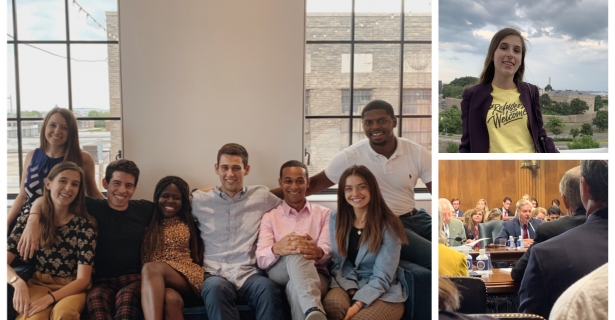As the end of my internship rapidly approaches, I have continued to fight for progressive immigration reform alongside my colleagues at the Immigration Hub, in Washington, D.C. While Congress moved towards its August recess, I had thought that things might have quieted down around the office, but I was quickly proven wrong. Although arrivals at the Southern border have been consistently decreasing, the fever pitch of the immigration debate has continued to rise. The Hub continues to assist like-minded legislators and presidential candidates as they attempt to craft a humane and effective response.
On the final day before the recess, I attended the Senate Judiciary Committee mark-up of Senator Lindsey Graham’s Secure and Protect Act (hint: it does neither of those things). Sen. Graham violated virtually every rule of the committee, resulting in an explosive exchange between him and Sen. Patrick Leahy of Vermont, when Leahy revealed that he had missed the meeting which Sen. Graham had accused him and his party of boycotting for a family funeral. Democrats were angered not only by Sen. Graham’s violation of committee rules but, crucially, by the bill which he was attempting to push through. For weeks, I have written almost daily, in memos for the Hill and summaries for fellow advocacy groups, about the far-reaching effects of the bill which, if enacted, would virtually eliminate access to asylum in the U.S. While the bill is unlikely to move in the House, and even now in the Senate, due to Sen. Graham’s violation of the rules, it is still a powerful example of the forces that my organization and our movement are up against.
While hearings like this can be exhausting, I am lucky that the Emerson Collective, the organization which the Immigration Hub is a part of, provides all of its D.C. interns with unique outlets for our collective (ha, get it) stress. Over the month of July, my fellow interns and I participated in a variety of Emerson-organized events, including a visit to the planned 11th Street Bridge Park, connecting the historically ignored Anacostia neighborhood with the rest of D.C. We learned from community organizers about how the Park is investing in the community in the area, to ensure that any gentrification that occurs leads to the elevation of all members of the community. My colleagues and I then dined at the new location of Busboys and Poets, a famous, business in the neighborhood.
Another exciting Emerson intern opportunity was our visit to the Smithsonian Museum of American History (SMAH). Instead of visiting the museum’s galleries, we were ushered to a secret elevator and down an unmarked hallway to a meeting room, filled with the leaders and curators of the Smithsonian Institution. Particularly relevant to my work at the Hub, we heard from the directors of the DACA Collecting Initiative, a newly formed division within the SMAH seeking to explore the lives of young, undocumented activists. The curators explained how these inspiring activists are wielding power without the power to vote and using risk, which arises when they expose their own legal status, to their utmost benefit. I was pleased to hear that they were working with several of the Hub’s closest partners, namely United We Dream and UndocuBlack, to record their stories. The Initiative hopes to eventually create an exhibit that will showcase the undocumented activist movement, and I hope to be one of the first people in line.
In between moments of joy and learning with my fellow interns and colleagues, I also experienced moments of profound sadness. When news broke of a mass shooting in El Paso, Texas, hours away from my hometown of San Antonio, one of my colleagues sent an almost prophetic email, that the shooter must have been targeting migrants. Hours later, multiple media outlets confirmed his suspicions, as it was revealed that the shooter had targeted the Walmart near the border for its cross-cultural ties. This atrocity intentionally cut across borders; the shooter knew it would. What he could not have predicted is how it would inspire us to fight back. This weekend’s attack was not just an attack against the migrant community, as it appears the shooter intended, it was an attack against us. As immigration advocates, my team and I are used to learning about atrocities, from horrible conditions in detention centers to discrimination against suspected migrants and even the deaths of migrants attempting to cross the border. Just as we can never grow accustomed to these conditions, we can never grow accustomed to attacks against American civilians, Mexican nationals, Central American migrants, and, above all, human beings, no matter which side of the border it occurs on.
In my final weeks at the Hub, with Congress now in recess, I am reluctant to predict that things will quiet down. While immigration is a natural, human phenomenon, the current dialogue in our country, on both a political and private level, has reached an unsustainable rapacity for justification and vilification, on both sides of the issue. Now, perhaps more than ever, accurate, timely, and unbiased information, which the Hub seeks to provide, is crucial if we want to move this dialogue forward. Thus, even if all is quiet on the Hill, my colleagues and I at the Hub will continue to turn up the volume on what matters.

